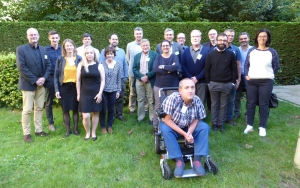Muscle Magnetic Imaging: Implementing muscle MRI as a diagnostic tool for rare genetic myopathy cohorts
- Number 247
- Date 20 September 2019
Location: Hoofddorp, the Netherlands
Title: 247th ENMC International Workshop on Muscle Magnetic Imaging: Implementing muscle MRI as a diagnostic tool for rare genetic myopathy cohorts
Date: 20 – 22 September 2019
Organisers: Prof. V. Straub (UK), Dr J. Diaz-Manera (Spain), Dr G. Tasca (Italy), Dr J. Warman Chardon (Canada)
Translations of this report by:
Danish by Prof. J. Vissing
Dutch by Mr. T. Veeger (young scientist)
Finnish by Prof. B. Udd
French by Dr P. Carlier
Italian by Dr A. Pichiecchio
Polish by M. Rataj
German by Dr A. von Moers and Mr. Schlagowski
Participants: Dr C. Bonneman (USA), Prof. P. Carlier (France), Prof. R. Carlier (France), Dr. J. Diaz Manera (Spain), Dr. R. Fernandez Torron (Spain), Dr D. Gomez Andres (Spain), Prof. H. Jungbluth (UK), Dr H. Kan (The Netherlands), Dr J. Morrow (UK), Dr F. Munell (Spain), Dr A. Pichiecchio (Italy), Prof. S. Quijano-Roy (France), Mr. M. Rataj (Poland),Prof. V. Straub (UK), Dr G. Tasca (Italy), Prof. B. Udd (Finland), Prof. J. Vissing (Denmark), Mr. T. Veeger (The Netherlands) and Dr J. Warman Chardon (Canada)
Twenty participants, including one patient representative, from European countries, USA and Canada attended the 247th ENMC sponsored workshop, focusing on muscle Magnetic Resonance Imaging (MRI): Implementing muscle MRI as a diagnostic tool for rare genetic myopathy cohorts. MRI assists with the diagnosis of genetic myopathies by identifying the pattern and extent of muscle tissue replacement by fat, signs of muscle inflammation, and wasting of single muscles or muscle groups. Muscle MRI can identify relevant muscles for biopsy that could not be easily identified clinically and subsequently can decrease the risk of a ‘negative’ or futile biopsy. Quantitative muscle MRI can also be applied to assess the progression of muscle diseases longitudinally in a non-invasive fashion, which is also relevant to assess the efficacy and safety of treatments in clinical trials.
Disease rarity has limited progress in MR imaging in determining imaging patterns in many genetic muscle diseases. First, the majority of muscle diseases have low numbers of participants/scans and there has not been a mechanism to systematically share anonymized images and develop large cohorts. Second, the proficiency to interpret scans that image all muscles in the body (whole body MRI; WBMRI) is limited to a few centres with larger patient cohorts and an established interest in muscle imaging. Finally, the variations in imaging protocols used in different centres make combining results difficult to achieve, as the majority of previous cohorts do not e.g. include scans of the upper extremities/trunk.
The aim of this ENMC workshop was to assemble the required expertise to establish standardized muscle MRI protocols, to identify key imaging findings for different disorders, to discuss an imaging platform to share images and finally to develop an education plan to convey these imaging findings to the wider medical community. The workshop participants discussed methods to assemble larger, international, imaging patient cohorts by developing a systematic methodological imaging approach and increase the use of quantitative imaging techniques. Participants in the workshop reviewed the new MYO-MRI online imaging platform, “MYO-SHARE”, and integrating coordination of image sharing with the European Reference Network for neuromuscular diseases (EURO-NMD). Integrating established imaging platforms will serve to avoid duplication of work, and to ensure better acceptance, utilization and sustainability of the project results by all stakeholders. Finally, the workshop deliberated over providing specialized education resources to radiologists and clinicians with access to curated MR images, highlighting key MRI features of specific genetic muscle diseases and building an online muscle imaging atlas.
WORKSHOP DELIVERABLES
Major workshop outcomes and benefits for patients with genetic muscle diseases:
- Developed recommendations for ‘best practice’ standardized protocols of acquiring muscle MRI scans
- Established the initial framework to begin cohort development to utilize a central imaging repository, MYO-SHARE
- Expanded a strategic educational plan to increase awareness and knowledge in the radiological/medical community by developing a publicly available online muscle imaging atlas
- Improved comprehension of distinct and overlapping imaging findings in various genetic muscle diseases

A full report will be published in Neuromuscular Disorders (PDF).
